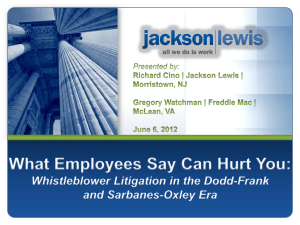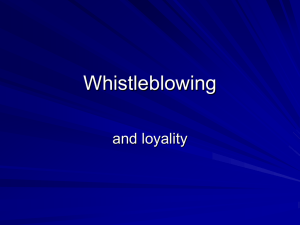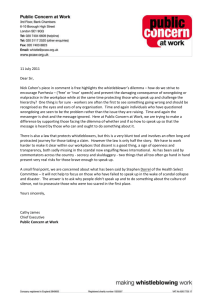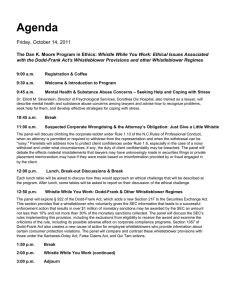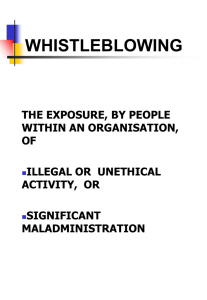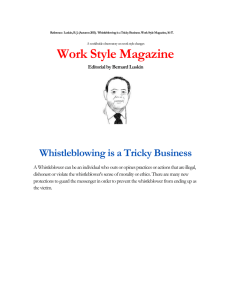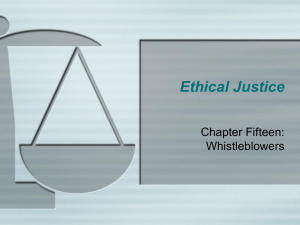TESTIMONY OF THOMAS DEVINE, MELANIE BETH OLIVIERO AND SOPHIA SAHAF
advertisement
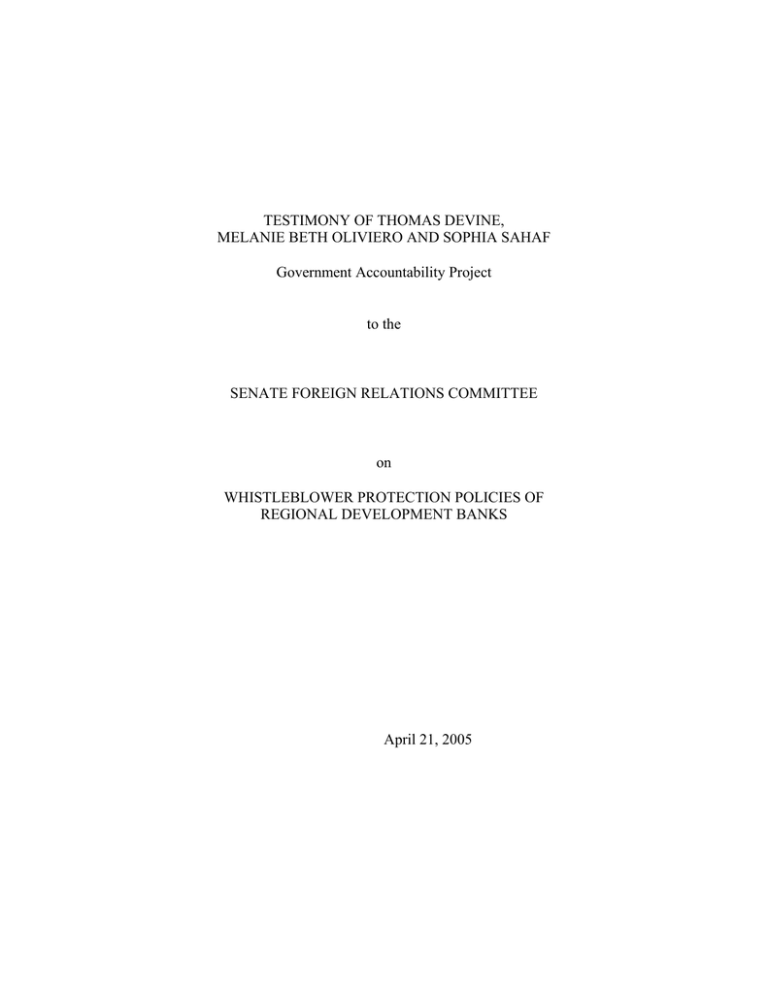
TESTIMONY OF THOMAS DEVINE, MELANIE BETH OLIVIERO AND SOPHIA SAHAF Government Accountability Project to the SENATE FOREIGN RELATIONS COMMITTEE on WHISTLEBLOWER PROTECTION POLICIES OF REGIONAL DEVELOPMENT BANKS April 21, 2005 Mr. Chairman: Thank you for this invitation to speak before the Committee. My name is Tom Devine and I am the Legal Director of the Government Accountability Project (GAP). I commend Chairman Lugar and the other members of the Committee for your serious commitment to Congressional oversight of the multilateral development banks (MDBs). It just does not get any more responsible or thorough that than this Committee staff’s broad-based, in-depth research as a foundation for reform. Whistleblowing is the human foundation for transparency reforms against corruption or other betrays of the MDB’s institutional missions. What we can contribute comes from our own oversight of whistleblower policies at the regional development banks and the World Bank. Our credentials to assess whistleblower policies are grounded in some 27 years of experience. GAP is a nonprofit, public interest organization dedicated to helping whistleblowers exercise free speech rights to challenge abuses of power that betray the public trust. Our mission is to advance governmental and corporate accountability by promoting whistleblower rights, investigating their claims, litigating their cases, sharing our expertise through publications, and developing legislative and regulatory reforms. We have led the campaigns to enact or defend virtually all national whistleblower laws in the United States. On the international front, GAP works with national governmental bodies. With colleagues from American University Law School we co-authored a model whistleblower law approved by the Organization of American States (OAS). Although as GAP’s legal director I am presenting this testimony, it is a composite work product from our international team that also includes its leader, director Melanie Beth Oliviero, and coordinator Sophia Sahaf. 2 Citizens in countries around the world aspire to the same freedom of expression and the right to know information that will protect them from unsafe and wasteful practices by government and private companies do the American people. The multilateral development banks are critical agents for other governments to meet these rights of their citizens. We wholeheartedly support these organizations’ development missions but are acutely aware they are under threat from corruption, waste and abuse of power. We also remain mindful that the United States has contributed billions of taxpayer dollars as donations and in the form of private investor funds to these institutions. We have a right to know if our money is being used to advance the welfare of poor people worldwide in a responsible, accountable manner. This Committee’s pioneering oversight work has demonstrated that conclusion would be a fantasy. We also know, because GAP has been investigating polices and practices of the African Development Bank, the Asian Development Bank, the European Bank for Reconstruction and Development, the Inter-American Development Bank, and the World Bank regarding whistleblower protection. In 2003 the Ford Foundation sponsored our indepth research to assess the procedures on which MDB whistleblower policies are based. Last summer we released the first four volumes for Challenging the Culture of Secrecy, our assessments of those institutions. We held off on the African Development Bank, because their leaders said a whistleblower policy was in the final stages of preparation. That is what they told the Treasury Department this year. So far, nothing has happened. As a result, we are finalizing a report on the current reality faced by African Development Bank whistleblowers. Unless there is dramatic improvement soon, a summary of our anticipated findings is enclosed as Exhibit 1. 3 The results of our audit of paper procedures were summarized in written testimony last July 26. It is enclosed as Exhibit 2. The bottom line was that we could not responsibly recommend the policies at any institution as safe channels to make a difference, instead of bypassing the institutions with leaks. Since then we have learned from over two dozen whistleblowers that as practiced, actual practices are far worse than paper policies. Their anti-corruption claims are more rhetorical than real. While there is no doubt that some light has been shone on corrupt practices, the banks are too eager to direct that light on client countries. It is imperative that the policies and practices of the banks themselves reflect the values of transparency and respect for human rights that they expect by the rest of the world. That is because these practices can have life and death consequences. For example, at a One World Trust conference last fall on organizational accountability, we saw dramatic visual evidence how corruption in Asian Development Bank irrigation projects functionally have turned the area they are supposed to benefit into a desert. Whistleblowers have told us how pipeline projects are severely undermining the lives of beneficiaries supposedly helped by increased energy access. Communities supposed to benefit from venture capitalism see their water supply poisoned, when the funds are diverted to large corporations that spend it on gold mines. GROUNDS FOR HOPE We have not yet seen grounds for optimism, but we are excited that there are grounds for hope. Particularly with respect to whistleblower rights, the dynamic at every institution except the Inter-American Development Bank has shifted from stagnant to dynamic. At the One World Trust conference last fall, the new leader for EBRD 4 whistleblower investigations teamed with GAP to recommend consensus principles for whistleblower reforms. But so far there has been no action at that Bank, which still does not have a specific policy. It is not credible for the Bank to continue asserting that protection can be inferred from composite procedures. In particular, the World Bank has commissioned highly respected Professor Robert Vaughn of American University Law School, a co-author of the OAS Model Law, to prepare a report recommending an overhaul of its whistleblower policy. Unfortunately, the Bank so far has declined to his release his work, creating the procedural equivalent of another oxymoron – secret transparency reforms. This Committee’s oversight vigilance will make a major difference whether Professor Vaughn’s work is the foundation for whistleblower reforms that could be applicable to all MDB’s, or becomes another example of objective professional expertise gathering dust. The magic formula for results will be persistence, persistence, persistence. We have come this far largely due to this Committee’s steadily increasing vigilance. Now is the time for all of us to intensify our efforts. That is particularly the case for the U.S. Treasury Department, responsible to monitor implementation of the “McConnell-Leahy” amendment to last year’s appropriations law. That provision requires the U.S. to use its voice and vote to implement transparency reforms by this coming June 1, including whistleblower policies consistent with U.S. and international norms. The law required Treasury to issue September 1 and March 1 progress reports to Congress. Last September’s Treasury report was little more than a rubber stamp of the status quo that could have been written by the Banks, and actually may have been to some degree. The March report was a far more 5 serious effort, and Treasury used its assignment as a bully pulpit to press the banks. However, at two banks without whistleblower policies, the AfDB and EBRD, Treasury credited promised reforms that have been pending long enough to become stale, failed to disclose or assess empirical track records, or offer specific recommendations. There is a long way to go before Treasury’s optimism is grounded in reality. GAP’s comments on the September and March Treasury reports are enclosed as Exhibits 3 and 4. RECOMMENDATIONS Last summer we made a series of reform recommendations, which below have been further refined and expanded from the lessons whistleblowers have taught us since. *Create a baseline for protected speech based on dissent against misconduct that threatens the institutional mission, rather than institutional self-interest. * Protect direct disclosures to external authorities such as the U.S. Congress, Treasury Inspector General or other law enforcement agencies when necessary to avoid a significant threat to public health and safety, damage to the bank’s mission or criminal violations of national or international law. * Protect participation in the citizen complaint mechanisms for addressing harm caused by MDB-financed activities. Safeguards could be included to prevent public release of proprietary information. * Provide a flow of information from secure hotlines to each bank’s Boards of Directors. * Break through the conflict of interest in internal appeals adjudications. This can be accomplished by offering alleged reprisal victims the opportunity to seek justice through third-party, independent, binding arbitration by a decision-maker selected through mutual consent. * Institutionalize the legal burdens of proof from the U.S. Whistleblower Protection Act to judge whether a whistleblower’s rights have been violated, as the World Bank does for reprisal investigations. * Provide prevailing whistleblowers full make-whole relief from confirmed retaliation, including provision of attorney fees and the right to reinstatement as necessary to maintain national residency rights. 6 * Establish independent autonomy and performance standards consistent with the U.S. Inspector General Act of 1978 for bank investigative agencies, to eliminate the conflicts-of-interest that too often have turned those offices into legalized retaliation units instead of credible institutional checks and balances for accountability. The conceptual basis for these recommendations is summarized below: 1.Align all personnel, lending and project policies – staff rules, environmental and social safeguards, policy review strategy papers (PRSPs), country assessment strategies (CAS), and the like – with pre-existing universal standards embodied in US and international law, starting with whistleblower protection. US constitutional and statutory law, and international human rights norms all confer fundamental rights to freedom of expression, the right to receive and impart information and the right to due process before a fair and impartial tribunal. Within the U.S., the Sarbanes-Oxley standards for whistleblowers at public corporations now set the international pace for whistleblower rights. Within the last few years the United Nations, Organization of American States (OAS) and Council of Europe all have reinforced a mandate for whistleblower protection through their anti-corruption treaties. The OAS has approved a detailed model law that is a composite of international and U.S. norms. There also is a long-established body of universal standards enshrined in enforceable international instruments such as the International Labor Standards of the International Labor Organization (ILO), and the protocols and conventions that enable enforcement of the Universal Declaration of Human Rights. Witnesses to misconduct and abuse at the banks live in fear of coming forward. Our evidence demonstrates that their fears are well founded. The banks routinely victimize the messenger rather than hold accountable those who defraud donor countries and recipient countries alike. For any MDB to be accountable it must provide safe channels for reporting corruption, fraud and harassment. 7 When senior staff such as public health specialist Dr. Sunil Chacko challenged MIGA (the Multilateral Investment Guarantee Agency) polices that result in dislocation of communities, and environmental degradation that undermine sustainable economic development, he found himself harassed. His duties were diminished and then his job terminated. Despite winning an appeal that validated his contention of reprisal and the written assurances of World Bank President James D. Wolfensohn that he would be reinstated, Dr. Chacko has never been offered a contract. 2. Adopt and enforce modern rules of procedures for the systems of justice and conflict resolution within the MDBs. The various appeals and tribunal mechanisms can only ensure due process if they are free from conflicts of interest, if all parties have access to legal representation (not just the bank) and genuine relief, and if resolution includes recourse to third party alternative dispute resolution. All of the banks’ appeals processes and administrative tribunals are tainted by conflicts of interest that render them no better than suspect grievance procedures. Quite simply, they lack independence. At most, the systems are thinly camouflaged procedures where a reprisal victim can ask an institutional bully to change its mind. They could do that without a whistleblower policy. In the EBRD, for example, the Bank president has discretionary authority to terminate employees. Since it is the Bank’s president who also selects the Tribunal president, this “justice” mechanism is fatally flawed. In the case of the AfDB, the Appeals Committee make-up has seven members chosen by the president, including the Chair and Alternate Chair, versus five members chosen by the Staff Council. Further, the adjudicators in these justice mechanisms are not professionally equipped, and record keeping is inconsistent. Often there are no transcripts of proceedings. Even worse, in other instances transcripts and hearings are secret. Secret trials and justice are 8 oxymorons. Petitioners have no rights to face their accusers and are generally not entitled to bring a lawyer with them to their hearings. Nor do rules permit the recovery of legal fees when the findings uphold their cases Persons seeking to challenge retaliation for reporting wrongdoing endure further abuse and institutionalized defamation for exercising their rights. For example, Dr. YangRo Yoon, a senior World Bank economist, reported a 40% overrun ($15 million) in a 1996 loan for schools in that nation.. In return for her service to the bank’s mission in reporting misappropriation of project funds, she has been harassed, humiliated, had her duties diminished, her office “downsized”, been terminated, and when she finally won reinstatement, it was to a lesser assignment. Dr. Yoon’s attempts to resist this reprisal have led her through a three-year nightmare of the Bank’s conflict resolution system. Despite “winning” her case, she lost salary, benefits and adjustments, such as not factoring in inflation. She has been compensated for only one-third of her legal costs, burdening her with $30,000 in personal expenses and placed in a position beneath her capabilities and credentials. She has been exiled from her former work and her expertise, to new duties irrelevant to her background. When she filed new appeals to enforce her initial ruling, the same Administrative Tribunal turned on her with decisions published on the Bank’s website that most graciously could be called judicial defamation. She has been warned that it is misconduct for her to continue seeking enforcement of her paper victory. In order for the MDBs to provide the right to a fair hearing, new procedures must be adopted that provide equal access to legal representation, witnesses, and documentation. There must be independence for decision-makers, at least from the supervisory chain of 9 command and more preferably from the institution, which can be accomplished through independent, mutual strike arbitration. Adjudicators must be selected in a fair and objective manner. Genuine “make whole” relief in the form of compensation for lost income, benefits and reimbursement of legal fees is required. 3. Extend requirements for independent external auditing of managerial and financial controls, and the range of appropriate authorities to which staff may report wrongdoing. All the MDBs operate within a closed loop of responsibility. Staff are not permitted to report corruption directly to Board members. Management can and has misrepresented information to Boards. In cases we have investigated this amounts to hundreds of millions of dollars. Only external oversight can assure accountability. External audits of both managerial and financial controls, such as are currently contained in the SarbanesOxley legislation in the U.S. for all publicly held companies, should be applied to the MDBs. Similarly, the banks’ current policies deny free speech rights to whistleblowers by limiting disclosures through prior restraint. Although whistleblower protection is supposed to further freedom of speech, the bank policies could not be more Orwellian. Every bank whistleblower policy is an Official Secrets Act, gagging employees from disclosing anything outside institutional walls that could undermine the interest of the relevant bank, regardless of the impact relevant misconduct could have for the bank’s mission. All the regional MDBs ban external whistleblowing, even to national and international law enforcement agencies, ministries of finance and legislative bodies, including the US Congress. Their own inspection panels for redress by aggrieved “beneficiaries” of Bank loans are treated as external bodies. Amazingly, employees are 10 vulnerable to discipline for testifying at a relevant bank inspection panel with the same evidence that would be officially protected when disclosed to a supervisor or in-house investigator. In recent years we have seen enough scandal resulting in massive waste and betrayal of the pubic trust to recognize that external oversight is a fundamental prerequisite for accountability. 4. Create truly independent investigative units with modern legal burdens of proof. The existing investigative units to which allegations of corruption are referred -- such as the Inter-American Development Bank’s Office of Institutional Integrity (OII) are handicapped at best, and at worst abused as tools of reprisal. It is not surprising that they do not have a significant track record of accomplishments from working with whistleblowers. We have seen evidence of investigations being instigated against whistleblowers in retaliation for their disclosures to these bodies. We have even seen investigations initiated as a tool for mass intimidation of whole office staffs. Requiring these units to report to external oversight bodies could significantly improve legitimacy. This would be consistent with the model of departmental inspectors general in the United States. One option would be for them to report directly to bank boards of directors. The Committee’s own series of oversight hearings on the MDBs and the recently launched JEC study of MDB accountability are testament to the need for this systemic reform. Beyond independence of these investigative units, there also is a demonstrable need for standard, modern investigative procedures to ensure fair, impartial, and replicable treatment of all credible allegations. Employees working with these units, voluntarily or 11 involuntarily, have no rights against investigators who turn on them, which is frequently the case from our review. Hotline procedures and standards vary drastically. Confidentiality procedures are inconsistent. CONCLUSION Yesterday Treasury Secretary Snow testified that the U.S. can justify increased MDB funding based on their institutional commitments to reform. Our experience indicates that in terms of empirical results, these assertions are largely a bluff. Whistleblower policies are in a time of transition but so far those commitments largely have been a bluff that with little positive impact. This Committee’s stepped up vigilance will be extremely significant in bridging the gap between the rhetoric and reality of accountability through transparency reforms like whistleblower protection. 12
